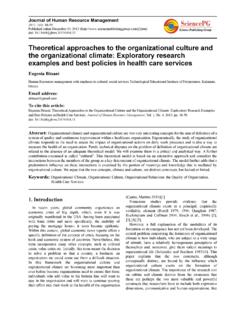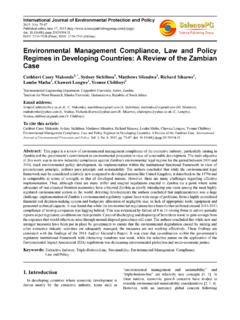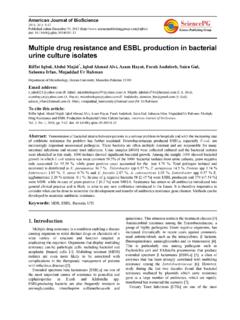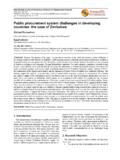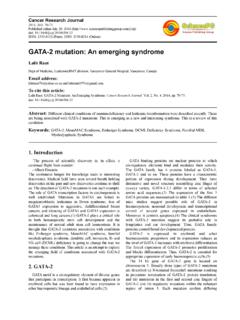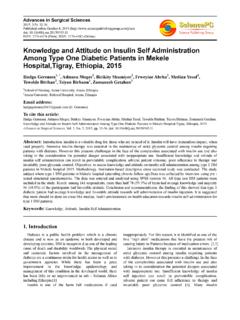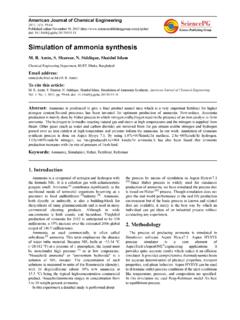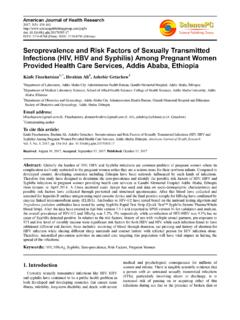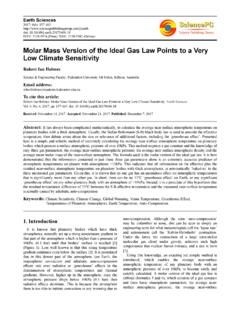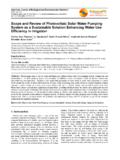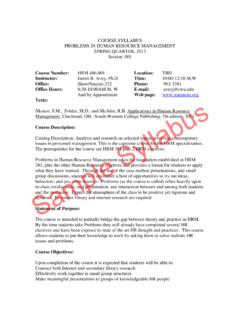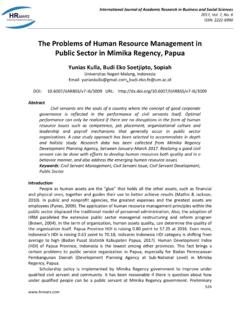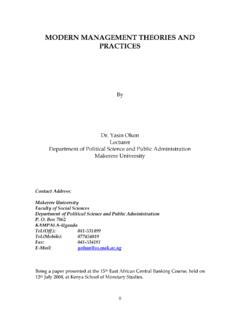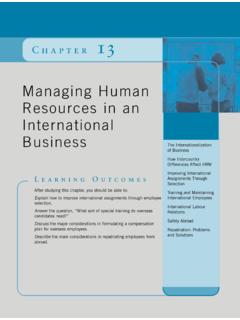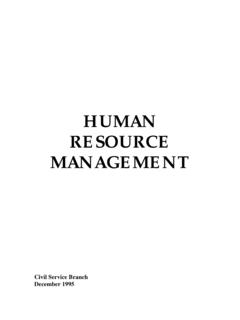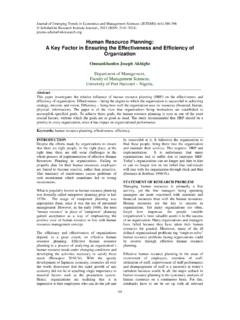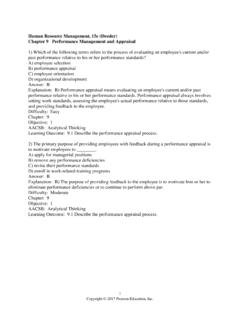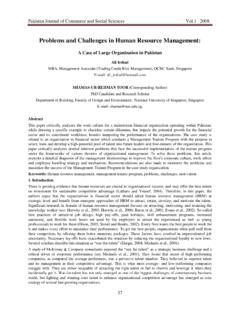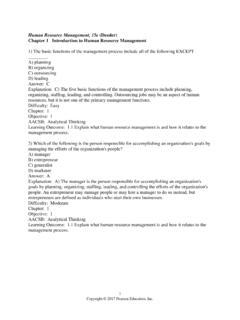Transcription of Human resource management challenges facing …
1 Humanities and Social Sciences 2014; 2(4): 87-95 Published online June 30, 2014 ( ) doi: Human resource management challenges facing local NGOs Rehema C. Batti School of management , Atlantic International University, 900 Fort Street Mall 40 Honolulu, Hawaii 96813, USA Email address: To cite this article: Rehema C. Batti. Human resource management challenges facing Local NGOs. Humanities and Social Sciences. Vol. 2, No. 4, 2014, pp. 87-95. doi: Abstract: Partnership with local NGOs has become an important feature in the development sector. Therefore the management of Human resources in local NGOs is crucial as it contributes to the performance and sustainability of the organizations. However many local NGOs face diverse challenges in the area of Human resource management . Local NGOs have inadequate HR management procedures in the organization and this affects the employee s work experiences and overall performance at individual and organizational level.
2 Many local NGOs due to the size of the organization and scope do not have a Human resource (HR) unit or a Human resource manager and therefore they appoint staff to oversee staff issues who often do not have the required Human resource skills and competencies to manage the employees. Another area that is challenging local NGOs is the fact that many depend on donor funds that are tied to funding cycles that are short term in nature. This affects the NGOs Human resource capacity in terms of the number and type of staff to recruit and employment duration. The mentorship of management and board members in Human resource management could be one way to improve Human resource competence in these organizations. This paper seeks to highlight Human resource management challenges local NGOs encounter and the importance of considering HRM as a strategic process that can contribute to sustaining an organization s performance.
3 Keywords: Human resource management in NGOs, challenges in Human resource , Human resource management 1. IntroductionPeople are an important aspect in all social organizations and from the perspective of the organization, people are resources and organizations cannot exist without them. The importance of people is immense as they support development of the organization s objectives and achievements for which NGOs are recognized for. Organisations are becoming aware that Human resources are an important asset that can provide sustained competitive advantages. However adoption of effective Human resource management (HRM) practices in many local Non Govermental organizations (NGOs) is often low in the list of management priority. Successful NGOs are those that recognize the significance of the Human element on organizational success and emphasize on their development, satisfaction, commitment and motivation in order to attain desired objectives.
4 Local (NGOs) often do not realize the importance of effective management of Human resources to the well being of the organization and hence do not invest adequate time or resources to build their capacity in necessary Human resource competencies. The lack of attention on the management of Human resource is one of the factor standing between success and failure in many local NGOs in developing countries. According to Ulah & Yasmin (2013:2) in the age of competitiveness organizations cannot afford to bear the loss of potential Human resource . Sustainable development of an organization depends upon effective management of its Human resources. However little attention has been paid on the adoption of effective Human resource management practices in many local NGOs in the development sector yet it is an aspect that can transform organization staff into a productive and motivated workforce capable of improving organization services.
5 Changing expectations of stakeholders, growth in internet 88 Rehema C. Batti: Human resource management challenges facing Local NGOs usage and rapid development of e-commerce is pressurizing organizations in every sector to make improvements in service delivery and Human resource effectiveness. The contribution of people to an organization is unpredictable, unique and has potential for further development because people have beliefs, values and different levels of experience that can be tapped for both individual and organizational benefit. How effectively local NGOs operate and achieve their goals depends largely on how professionally and productively people are managed. Employees are required to understand the future of the organisation and their own future in the organisation this helps triggers commitment and hence sustained productivity. Hence it is right to say that local NGOs are dependent on the contribution of the Human resource that exists within the organization and as an organization they have no choice but to proactively identify and explore opportunities that will assist in building their competency in managing employees.
6 2. Overview of Human resource management Definition and Practice Definition of Human resource management Human resource management is a core management function in any type of organization. It creates the most crucial condition for organizational performance. Human resource management is a process that assists organizations recruit, select and develop staff within the organization. According to Stanley and Albin (2013:209)1 they define Human resource management as a management function within organizations concerned with people and their relationships at work. The foundation of HRM is that everyone in the organization is capable and has the ability to perform and it s the sole responsibility of management to put in place system and structures to motivate performance. One of the purpose of the HRM is to build an organisation with the right persons , in the right positions and at the right time.
7 The purpose of a Human resource framework is to guide organizations to achieve this objective. The issues revolving around managing Human resources can be split into two: Strategic HRM Here the focus is on the system as a whole. It targets long-term issues as concerns organization structure, quality of service, organizational culture and commitment that exist and then looks into linking resources with future vision. Operational HRM This deals with issues at the individual level, such as 1 Stanley Vincent, Albin Joseph (2013) challenges for Human resource experts in Global scenerio. International Journal of advancement in Research and Technology. Vol 2, Issue 4,April career planning and activities. Examples of include employment applications processing, filling open positions, training supervisors, addressing safety and health problems and handling salaries.
8 The HR framework enables organizations to manage their Human resources effectively and tries to link Human resources with the organizations strategic goals. This also involves taking into considerations internal and external factors that affect Human resources which influence changes in strategies and practice in Human resource management . Human resource Theories Human resource management principles and techniques are drawn from various theories found in different According to Michael Armstrong (2012:6-7)2the following are the theories that guide HRM: resource Dependency Theory Scarcities of resources determine policies and procedures to be adopted by organisations. Employees are scarce resources, which should be carefully managed. Competitive Advantage Theory Organisations should capitalize on competitive advantage it has over other organisations. An employee is a rare resource , immutable, non-substitutable, and valuable In order to gain from competitive advantage, there should be creation and support of organizational culture that ensures effective management of training and performance management functions.
9 Institutional Theory Organizational norms, values, attitudes and myths are the sources of organizational failure or success. These need be coordinated and managed to ensure effectiveness. Agency Theory In this theory the employer and employee have a principal-agent relationship. As there may be disagreement between the two, legal implications have to be carefully considered and, if possible, litigation should be avoided. General Systems Theory Organisations are complex systems. Human resource management is a sub system. Failure/success of each component will have overreaching impact to the organisation. Human Capital Theory It is an economic approach which describes people are valuable assets. This emphasizes investing in people as one does with other organizational assets. Organization Life Cycle Theory Organisations are seen to grow in different stages. They 2 Armstrong Michael (2012), Armstrong s Handbook of Human resource management practice.
10 (12th edition)UK. Ashford Colour Press Humanities and Social Sciences 2014; 2(4): 87-95 89 start, grow, mature, decline and revive. This theory links the Human resource management according to the stage of growth of the organisation. Role Behavior Theory The means used by an organisation to send role information determines role response (behavior). Human resource management should focus on improving the role information for employees. Organizational Change Theory Organisations pass through different forms, levels of quality, and states over time. Human resource management should ensure congruence between stated goals, changes, and performance. Transaction Cost Theory It is an economic point of view of governance structures in business transactions. It considers costs of establishment, monitoring, evaluation, and enforcement of exchanges (contracts). Since managers have limited information for decision making (bounded rationality) before transactions, there must be measures to reduce risks.
